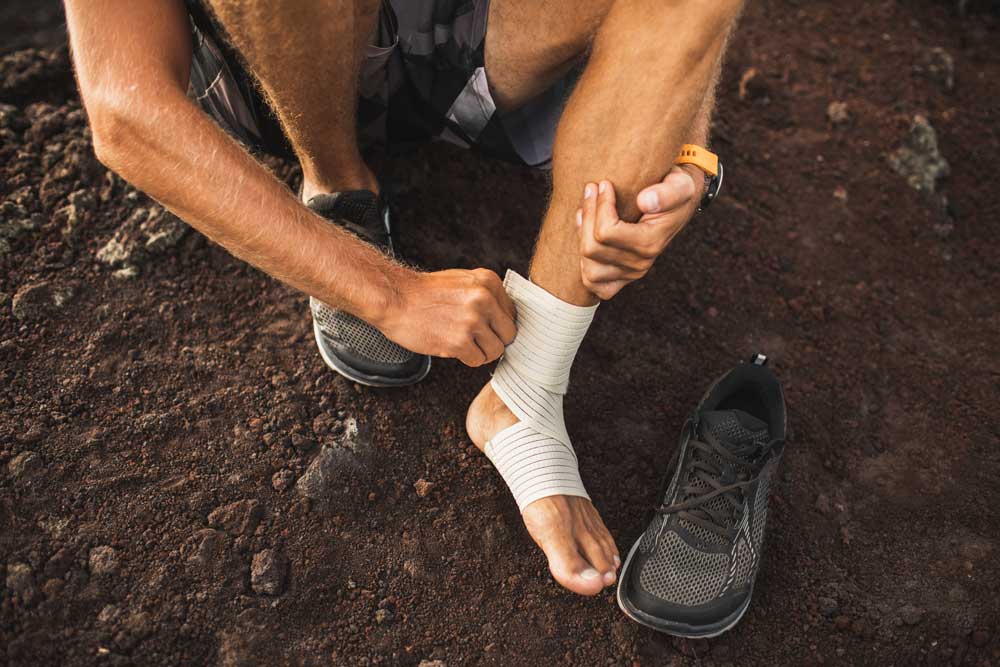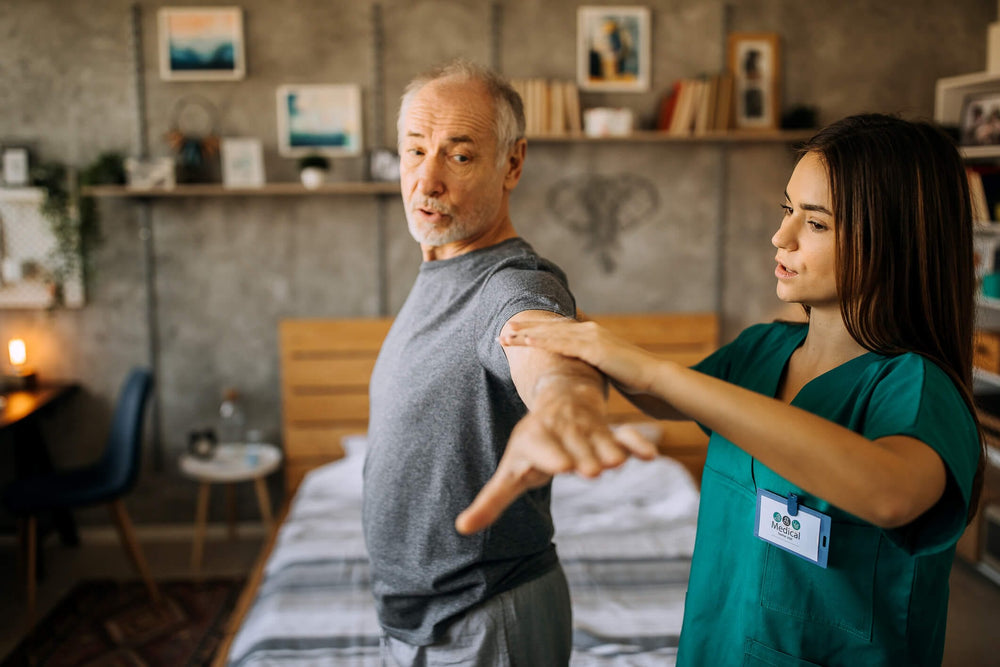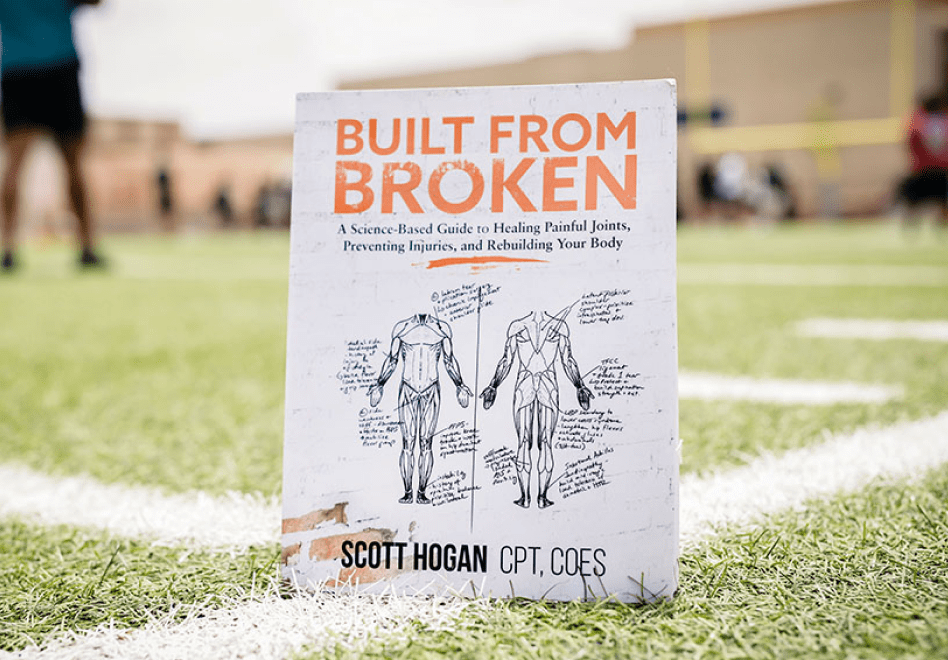
Be built (to last).
The right supplements can help you recover naturally and build a resilient body.

Supplement Quiz
Take this short quiz to discover the perfect supplements for your needs and goals.
About SaltWrap

Built from Broken
Get the best-selling book from SaltWrap founder, Scott Hogan, and start rebuilding today.
How To Postpone Knee Replacement Surgery

By Dr. Ro Mahajan, MD
Knee replacement is the most commonly performed orthopedic surgery in the United States. Many consider it a last-resort treatment for osteoarthritis of the knee — a degenerative condition that causes the cartilage within the joint to break down over time.
But that’s not always the case.
While osteoarthritis (OA) can begin as early as age 35 due to natural wear and tear, its progression can be accelerated by factors such as high-impact sports, previous injuries, obesity, and abnormal biomechanics caused by gait abnormalities or other musculoskeletal conditions.
The resulting pain is typically worse after periods of inactivity and can significantly impair mobility and daily function. As arthritis advances, it may even lead to leg misalignment, which can further exacerbate joint damage and discomfort.
This is why some experts might push knee replacement surgery earlier than others. As a result, some patients may believe it’s their only viable option.
The good news is that there are many non-surgical strategies that can help manage knee arthritis, reduce pain, and potentially delay — or avoid altogether — the need for surgery.
Let’s start with some of the most common and conservative non-surgical strategies for managing knee osteoarthritis — and postponing knee replacement surgery.

Non-Surgical Strategies for Managing Knee Osteoarthritis
Weight Loss
Weight loss is perhaps the single most effective way to slow the progression of knee osteoarthritis and relieve pain.
Research shows that for every pound of weight lost, there is approximately a four-pound reduction in pressure on the knees during activity. If you are overweight or obese, even modest weight loss can yield meaningful improvements in knee pain — and in overall health.
Medications
Acetaminophen (Tylenol) is often used as a first-line treatment for knee arthritis pain. Non-steroidal anti-inflammatory drugs (NSAIDs), such as ibuprofen (Advil) or naproxen (Aleve), may also be helpful. But these medications carry risks — especially with long-term use — such as gastrointestinal, kidney, and cardiovascular side effects.
Always consult your physician before starting regular use of these medications. (And if you’re looking for natural alternatives to NSAIDs, here are three of the best.)
Physical Therapy
Working with a licensed physical therapist can be one of the most impactful and sustainable ways to improve knee function and reduce pain. Strengthening the quadriceps and surrounding muscles helps offload pressure from the knee joint, stabilizing the area and reducing further wear. I’ve seen many patients avoid surgery by simply committing to a structured physical therapy program.
Conventional Medical Interventions
When conservative approaches no longer provide adequate relief, the next tier of treatments often includes:
Corticosteroid Injections
These help reduce inflammation and provide temporary pain relief. But repeated use can be detrimental to cartilage health. (You can read more about my thoughts on these injections, as well as three of my favorite natural alternatives, HERE.)
Hyaluronic Acid Injections
This synthetic lubricant may help some patients by improving joint mechanics, though results typically take 3-4 weeks to appear and are not guaranteed.
Knee Replacement Surgery
Yes, this is the intervention we’re hoping to postpone (or avoid). However, in the case of severe arthritis, this can be the most effective course of action. That said, this is a major procedure that involves substantial recovery time (typically six weeks or more). It also carries a notable risk of ongoing pain. Studies show that up to 20% of patients report persistent pain after knee replacement surgery.1
Regenerative and Alternative Therapies
For patients seeking to delay or avoid knee replacement — and who do not yet have severe deformity or bone-on-bone arthritis — there are several emerging and complementary options that may be beneficial:
Platelet-Rich Plasma (PRP) or Stem Cell Therapy
These biologic treatments aim to harness the body’s natural healing potential to reduce inflammation and support tissue repair. PRP has shown promise in mild-to-moderate knee OA, especially in patients under 65.
High-Intensity Laser Therapy
This non-invasive therapy uses light energy to stimulate cellular repair and reduce inflammation. It can provide pain relief and help improve mobility for some patients.
Shockwave Therapy
Originally used in sports medicine, this modality uses acoustic energy to stimulate healing. While more commonly used for tendon conditions, some patients with knee arthritis have reported improvements in pain and function.

My Approach as a Regenerative Medicine Physician
In my practice, I aim to help patients reduce pain, maintain function, and avoid unnecessary surgery using the safest and least invasive treatments available.
For those looking to delay or avoid knee replacement surgery, I often recommend a comprehensive strategy that includes:
-
Weight loss (if appropriate)
-
Regular physical therapy
-
Targeted regenerative medicine therapies
From there, if necessary, more drastic interventions — suchas corticosteroid injections or even surgery — might be worth considering.
Putting It All Together
Every patient is unique.
The key is to work with your healthcare provider to build a personalized treatment plan that targets the underlying biomechanics, reduces inflammation, and helps preserve your joint health for as long as possible.

Dr. Ro Mahajan, MD
Dr. Ro Mahajan received his MD from the University of Toledo College of Medicine in 2011. He has been double board-certified by the American Board of Anesthesiology in Anesthesiology and Pain Medicine since 2016.
Ro Mahajan MD trained in the nation’s top hospital systems, including the University of Michigan and UCLA. Today, he practices in two settings. He provides insurance-based mainstream medical care for pain-related conditions through one of the nation’s largest hospital systems.
He also offers natural and regenerative treatment options through Regenerative Orthopedix, a private practice in Fargo, North Dakota.
Ro Mahajan MD is a founding member of SaltWrap's Clinical Advisory Board.
Founder: Scott Hogan

I created SaltWrap to bring together the most practical ideas in therapeutic sports nutrition, corrective exercise, and functional fitness — with the goal of keeping you (and myself) strong, mobile, and built to last.
I've worked as an A.C.E. Certified Personal Trainer, Orthopedic Exercise Specialist, and nutritional supplement formulator.
But more importantly — I've spent most of my life battling injuries, joint pain, and just being plain beat up. So I know what it's like to struggle toward fitness goals.
SaltWrap is here to push you through injuries, setbacks and perceived physical limitations. To a place beyond what you think you're capable of. Sign up here to stay in the loop.
Learn more about my best-selling injury prevention and recovery book, Built from Broken.






